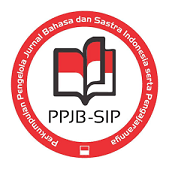PEMBELAJARAN MENYUNTING TEKS CERITA PENDEK BERDASARKAN KURIKULUM 2013 DI KELAS XI IB 2 SMA NEGERI 1 BLAHBATUH
DOI:
https://doi.org/10.23887/jjpbs.v5i3.8761Abstrak
Penelitian ini bertujuan mendeskripsikan perencanaan, pelaksanaan, dan evaluasi pembelajaran menyunting teks cerita pendek berdasarkan kurikulum 2013 di kelas XI IB 2 SMA Negeri 1 Blahbatuh. Penelitian ini menggunakan rancangan deskriptif kualitatif. Subjek penelitian ini adalah guru bahasa Indonesia yang mengajar di kelas XI IB 2 dan siswa kelas XI IB 2 SMA Negeri 1 Blahbatuh. Objek penelitian ini adalah pembelajaran menyunting teks cerita pendek. Metode pengumpulan data yang digunakan adalah dokumentasi, observasi, dan wawancara. Hasil penelitian ini menunjukkan, perencanaan pembelajaran sudah sesuai dengan kurikulum 2013. Akan tetapi, masih memiliki beberapa kelemahan, meliputi (1) alokasi waktu dalam RPP yang dibuat oleh guru seharusnya dicantumkan untuk 2x pertemuan, (2) guru tidak merinci langkah-langkah pembelajaran pada masing-masing pertemuan, (3) guru tidak mencantumkan program pengayaan dan remidi, dan (4) guru kurang mencantumkan tes lisan dan penugasan dalam RPP. Pelaksanaan pembelajaran yang dilakukan oleh guru sudah menggunakan pendekatan saintifik. Akan tetapi, masih terdapat ketidaksesuaian antara RPP yang dirancang guru terhadap pelaksanaan pembelajaran di dalam kelas. Ketidaksesuaian pertama, guru tidak menyampaikan secara sistematis langkah-langkah pembelajaran pada kegiatan inti. Kedua, kegiatan pembelajaran tidak sesuai dengan RPP. Ketiga, program pengayaan dan remidi yang diberikan oleh guru kepada peserta didik. Evaluasi pembelajaran yang dilakukan oleh guru sudah sesuai dengan penilaian autentik. Akan tetapi, masih terdapat kelemahan, yaitu terletak pada rubrik penilaian tes lisan tidak dicantumkan, daftar pertanyaan untuk tes lisan juga belum disediakan, dan daftar pertanyaan tes tertulis juga tidak sesuai dengan RPP.Kata Kunci : pembelajaran, menyunting, teks cerita pendek, kurikulum 2013
This study purpose to describe the planning, implementation, and evaluation of learning text editing short stories based on the curriculum in 2013 in class XI IB 2 Senior High School 1 Blahbatuh. This study used a qualitative descriptive design. The subjects were Indonesian teachers who teach in class XI IB 2 and IB 2 class XI student of Senior High School 1 Blahbatuh. The object of this research is the study of short stories edited text. The data collection methods used were documentation, observation, and interviews. The results of this study showed that the learning plan is in accordance with the curriculum of 2013. However, it still has some drawbacks, including (1) the allocation of time in the RPP (leson plan) made by the teacher should be listed for twice meeting, (2) the teacher did not specify the learning steps in each meeting, (3) the teacher does not list enrichment and remedial programs, and (4) the teacher is not included oral tests and assignments in the RPP (lesson plan). Implementation of learning do by teachers already use a scientific approach. However, still there is a mismatch between the RPP (lesson paln) are designed teachers' teaching practices in the classroom. Incompatibility first, the teacher does not convey systematically learning steps on core activities. Second, learning activities are not in accordance with the RPP (lesson plan). Third, enrichment and remedial programs given by the teacher to the student’s. Evaluation of learning do by teachers is in conformity with the authentic assessment. However, there are still weaknesses, which lies in the assessment rubric oral tests are not listed, the list of questions for the oral test has not been provided, and a list of questions written test is also incompatible with the RPP (leson plan).
keyword : learning, editing, text short stories, curriculum 2013
Diterbitkan
2016-11-03
Terbitan
Bagian
Articles
Lisensi
Authors who publish with the Jurnal Pendidikan Bahasa dan Sastra Indonesia Undiksha agree to the following terms:- Authors retain copyright and grant the journal the right of first publication with the work simultaneously licensed under a Creative Commons Attribution License (CC BY-SA 4.0) that allows others to share the work with an acknowledgment of the work's authorship and initial publication in this journal
- Authors are able to enter into separate, additional contractual arrangements for the non-exclusive distribution of the journal's published version of the work (e.g., post it to an institutional repository or publish it in a book), with an acknowledgment of its initial publication in this journal.
- Authors are permitted and encouraged to post their work online (e.g., in institutional repositories or on their website) prior to and during the submission process, as it can lead to productive exchanges, as well as earlier and greater citation of published work. (See The Effect of Open Access)







